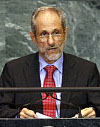
Following the release of the Obama administration’s new Sudan strategy, leaders from the North, South, and some rebel groups, have, in a rare moment of unanimity, reacted positively to the news.
Sudanese presidential advisor Ghazi Salahuddin focused on Khartoum’s victories in the new policy—the softer, we-are-open-to-engagement side: "Compared to previous policies there are positive points… we don’t see the extreme ideas and suggestions which we used to see in the past.” The “extreme ideas” he cited included U.S. military intervention and the creation a no-fly zone over Darfur.
But, he was also quick to express his disappointment with the administration’s continued use of the term “genocide,” saying it “isolated” the U.S. from the international community.
It was the use of “genocide” to describe the Darfur conflict, on the other hand, that was a point of victory for Abdel-Wahid Al-Nur, leader of the Darfuri rebel group Sudan Liberation Movement.
To draw a distinction between the new strategy and the U.S. Special Envoy to Sudan Scott Gration’s earlier approach, he praised Secretary Clinton and criticized Gration. “What [Clinton] called for is in line with our [SLM] position on conflict suspension and providing security to civilians.” Gration, on the other hand, “made genocide legitimate,” Abdel-Wahid said.
Another Darfuri rebel group, the Justice and Equality Movement, was quoted in the same article as saying that the strategy “show[s] a good direction to resolve the conflict,” but warned that Khartoum may simply be “buying time.”
The southern ruling party, the Sudan People’s Liberation Movement issued a positive, but more reserved, statement to Bloomberg: “The policy is in line with the SPLM position.”
Of course, it’s easy to converge on a policy with few specifics. As the headline of Sudan Tribune’s coverage of the policy unveiling said bluntly: “US offers no details on ‘carrots and sticks’ of Sudan policy.”
This absence of details has led other representatives of Sudanese society to be more cautious with their praise.
Badru Mulumba, the Sudan correspondent for the Daily Nation, said in an email to Enough:
"While the U.S. Policy unveiled Monday probably will go quite some way into closing this gap, it’s troubling for its lack of specifics, especially in regards to the North-South peace agreement. No datelines for when a Referendum Law should be in place. No suggestions for when elections must be held. Basically, no suggestions for anything. It’s possibly a way for the Administration to avoid setting targets which may be easily missed, while it has no specific sticks to use against the regime."
Major tests of the Obama administration’s new approach are coming soon, with national elections in a mere six months and efforts to kick-start a Darfur peace process underway as we speak.
Photo: Sudanese presidential advisor Ghazi Salahuddin (UN Photo)

